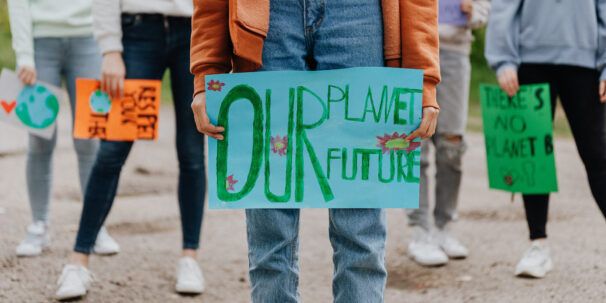How to take climate action: Fighting the climate crisis
Feeling powerless in the fight against climate change? Read our top tips for taking climate action and engaging others to join you.

By Rhiannon Wardle
There’s no denying that climate change is currently wreaking havoc on our planet. This summer, we experienced extreme heatwaves and droughts throughout Europe resulting in over 16,000 deaths. We also had devastating floods in Pakistan after temperatures reached a record high in April.
These are just two of the most notable examples of climate catastrophes this year – but we’re also experiencing the mass extinction of species, destruction of rainforests, plastification of the ocean and consistently rising sea levels.
It’s enough to make anyone feel anxious. But, if you do feel anxious, you’re not alone, and you’re certainly not powerless.
Getting involved with climate action is the best way to enact societal change, help your community, and empower yourself. It can be pretty intimidating to get started, which is why we’re here to help.
We’ll start by talking about why climate action is necessary and powerful before sharing our top tips for getting started.
What is climate action?
Put simply, climate action encapsulates all activities, projects and measures that aim to tackle the climate crisis. Most notably, the aim of climate action is to reduce the number of fossil fuels burned and therefore decrease the number of greenhouse gases released into the atmosphere.
The term ‘climate action’ can also refer to policy and legislation changes made by governments and international organisations to tackle climate change – but in this article, we’re focusing on individual and community actions you can take.




What are some examples of climate action?
It’s always so much easier to understand what something actually entails when there are examples. So, here are some different types of climate action – you can click on each one to find a real-life example of it.
- Climate protests
- Climate strikes
- Community climate projects
- Boycotting brands, businesses and organisations
- Disrupting events
- Blocking construction or demolition
- Writing letters to governments and businesses
- Teaching others about sustainability and climate action
- Leafletting and postering
- Hosting climate events
- Climate litigation
Why is climate action important?
Climate action is essential in the fight against climate change because it puts pressure on governments, brands, businesses and other organisations to take action. Ultimately, our individual choices can only take us so far in the fight against the climate crisis – to enact real change, we must influence those with significant power in society.
But what if nobody listens to us?
This is a real concern that many of us have when deciding whether to take action for the climate, or even other social justice and humanitarian issues. However, evidence shows that climate action really does make a difference.
For example, Cambo was set to be a huge oil field in the North Sea off the coast of Scotland, but climate groups such as Stop Cambo and Greenpeace actually halted the plans.
After Shell, a fossil fuel giant, pulled out of the investment, the owner decided to pause the $2.6 billion project. This success was the result of many ordinary people getting involved with climate action groups and protesting against the oil field in different ways.
More recently, HSBC announced that they would stop funding new oil and gas projects, as part of a policy uphaul. This is a huge win for the planet, as HSBC is currently one of the biggest fossil fuel investors in the world. There is no doubt that this decision has been influenced by the many protests and disruptions organised against HSBC in recent years.
How can I take action to fight the climate crisis?
Now that you understand the power of climate action, it’s time for our top tips. Here are five simple steps you can take to start fighting against climate change and transforming our planet.
1. Make more sustainable and ethical individual choices
We all have to start somewhere, so why not start with your everyday choices? Things like what we consume, who we bank with, where we buy clothes from and the amount of energy we use may seem like small things, but they all add up.
Of course, it’s easiest to live sustainably and ethically when you have the money and time to pay attention. However, it’s not always expensive or difficult.
We discuss everything from affordable sustainable fashion and renewable energy in our article on sustainability. You might also be interested in learning how to reduce your plastic consumption and carbon footprint.
If you want to look at sustainability through a new lens, you can also try our Solving Sustainability Challenges with Te Ao Māori (Māori World View) course by TePukenga New Zealand.
2. Join a climate action group
Although our individual choices can make a small difference, it’s vital that we tackle the climate crisis together. The first step here is to join a climate action group near you.
You don’t need to have any experience or a relevant degree to join one of these groups – they want all the help they can get! If you sign up today, they’ll likely be grateful for your support.
Friends of the Earth have created this great tool to help people find a local climate action group in the UK. All you need to do is type in your postcode and check out the results. You’ll probably find that different groups focus on different things, so you can play to your strengths and interests.
3. Get involved with climate action in your community
Now that you’ve found a group, it’s time to get involved! This can be as simple as attending their weekly or monthly meetings at first, just to learn more about what they do and start thinking about actions you can take.
Then, plenty of opportunities will arise for you to get involved. These opportunities may be in-person, but there will also be plenty of things you can do from home, so don’t worry if you don’t have the free time to show up physically. You could be doing climate research, writing letters, or creating social media posts – the possibilities are endless.
You can learn more about being a climate activist in our Championing Change: Human Rights and the Climate Crisis course by Amnesty International.
4. Start organising your own climate actions
Once you’ve attended a few events or joined in with various actions, the next step is to organise something yourself. This doesn’t have to be anything big, but the more people organise climate actions, the faster we will see change enacted.
Why not start with your workplace or university? You could organise an event, talk or protest. This could start as a discussion with others who want to get involved, then you can have a group meeting and plan out your actions together. The final thing to do is spread the word!
Our Leading Sustainable Communities and Organisations course by The Mind Lab will help you to understand leadership approaches to sustainability – a skill that will surely help you to lead climate actions.
5. Spread awareness
So, you’re getting involved with different branches of climate activism and organising your own actions. Now it’s all about getting the word out. Spreading awareness is a huge part of climate action, as activists hope to inspire other people to join in.
Luckily, this is increasingly easy to do. Many climate activists are very active on social media because it’s a great way to educate the masses, promote actions they’re taking, call out brands and businesses, and inspire other people.
If you need some help becoming more social media savvy, you can join our Creating Engaging Content for Social Media and Instagram Marketing Essentials courses.
You may also be interested in our Communicating Climate Change for Effective Climate Action course by the University of Glasgow, where you’ll develop your climate communication skills and learn how to engage others.
Take action today
We hope this article has been informative for those of you hoping to start taking tangible actions against climate change. In this day and age, it’s so easy to feel paralysed and overwhelmed by eco-anxiety and the negative media coverage of climate activists, but we all have the power to make a difference.
Stepping out of your comfort zone may be scary, but the positive consequences could be life-changing. Make sure to check out our full range of climate action courses for more expert guidance.








